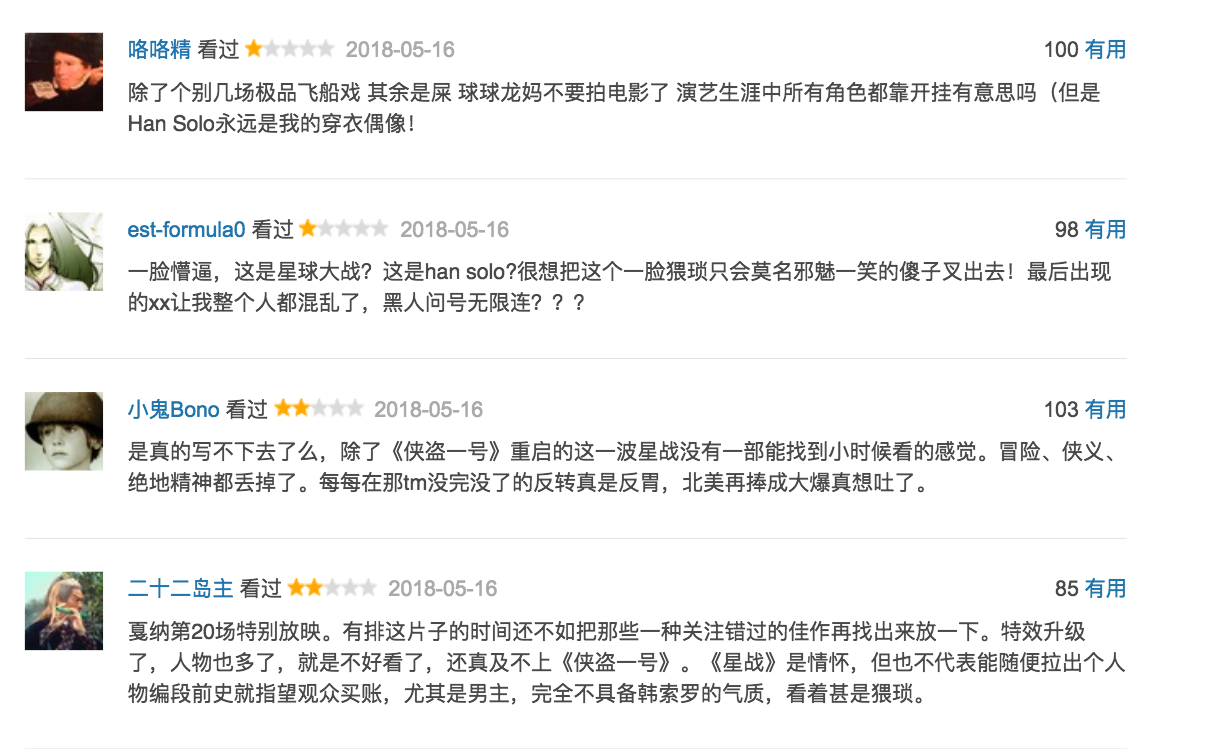Alden Ehrenreich’s ‘stiff acting’ is killing ‘Solo: A Star Wars Story’ at the Chinese box office

Solo: A Star Wars Story was a domestic box office flop, and it hasn’t done much better across the world. Last weekend, it grossed a mere $9.6 million in China, putting it behind Chinese sci-fi comedy How Long Will I Love U (超时空同居 chāo shíkōng tóngjū) and Avengers: Infinity War. Its opening weekend gross is less than a fifth of what The Force Awakens earned in China in its first weekend — $52 million — and also lags far behind Rogue One’s $31 million and The Last Jedi’s $28.7 million.
Star Wars has always struggled to make a dent at China’s box office, but the debut of Solo: A Star Wars Story is disappointing even by the franchise’s standards. Industry insiders currently estimate that the Han Solo spinoff might end up grossing only $19 million at the Chinese box office. If such projections are accurate, that’ll make Solo the franchise’s lowest-performing installment in China yet.
How Long Will I Love U’s trouncing of Solo at the box office is the second time that a domestic comedy has defeated a Star Wars film in China. Last year, The Ex-File 3: The Return of the Exes (前任3: 再见前任 Qiánrèn 3: Zàijiàn Qiánrèn) surprised everyone when it snagged the top spot at the box office from The Last Jedi. The low-budget romantic comedy managed to rake in $45 million in its opening weekend despite polarizing reviews, while The Last Jedi debuted to a sluggish $28.7 million.
On Douban, Solo currently has a 7.0 rating, the lowest in the Star Wars series. The movie has garnered mixed reception on Douban, with some reviewers commending that the movie is a worthy entry in the franchise, and others criticizing it for its acting and its “boring storyline.” Most of the Chinese viewers’ dissatisfaction with the movie seems to stem from the casting of Alden Ehrenreich as a young Han Solo. Many viewers have complained about his “stiff acting” and the lack of chemistry between him and Emilia Clark, the movie’s female lead. Some have even gone as far as to call Ehrenreich’s appearance in the movie “weasel-faced” and “sleazy,” and bemoan his lack of charisma compared to Harrison Ford.

Solo, however, is not the only Star Wars film to stumble in China. With the exception of The Force Awakens, movies from the space opera franchise have failed to pass the $78 million (500 million RMB) benchmark at the box office. For comparison, the Marvel films gross an average of $80 to $90 million, with the Avengers series earning even more. Infinity War, in particular, has so far grossed $336 million in China, making it the third highest-grossing Hollywood export in China’s box office history.
An unfamiliarity with the previous Star Wars films has long been cited as a reason for China’s lukewarm reception toward the franchise. The original trilogy was never released in China’s theaters, thus making the nostalgia factor, an important box office attraction for the movie’s North American audience, less of a draw for Chinese audiences, who grew up with series like Transformers, Harry Potter, and the Marvel films.
Analysts have pointed out that the lack of marketing of Solo in China may have also led to the movie’s dismal box office performance. For The Force Awakens, Disney launched a full-on marketing blitz, appointing teen heartthrob Lu Han 鹿晗 as a brand ambassador for the film and arranging to have 500 stormtroopers “storm” the Great Wall. To familiarize Chinese audiences with the franchise, Disney also signed a deal with Tencent to make the previous installments available for streaming. And for Rogue One, Disney cast not one, but two famous stars in China, Hong Kong martial arts star Donnie Yen (甄子丹) and Chinese actor-director Jiang Wen (姜文), with the hopes that Chinese audiences would be lured to theaters by the presence of familiar faces in a Hollywood blockbuster.
In contrast, the marketing activities tied to Solo have been minimal at best. According to entertainment media account Yiyuguancha, there are only 94 Chinese video clips and other related promotional material for the movie, compared to Infinity War’s 187. Solo also trends far lower than Infinity War in terms of press and Weibo mentions. Box office analysts have speculated that the scaling down of marketing in China may be a sign that Disney has resignedly accepted that the Force just isn’t strong in the world’s second-largest movie market, and that the company may have decided not to pour as much money into promoting Solo as they did with The Force Awakens or Rogue One.





